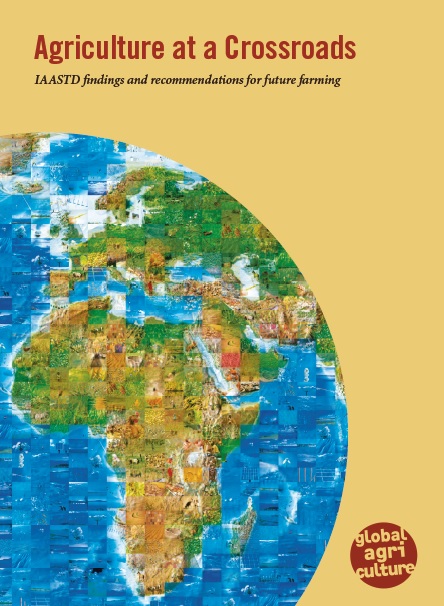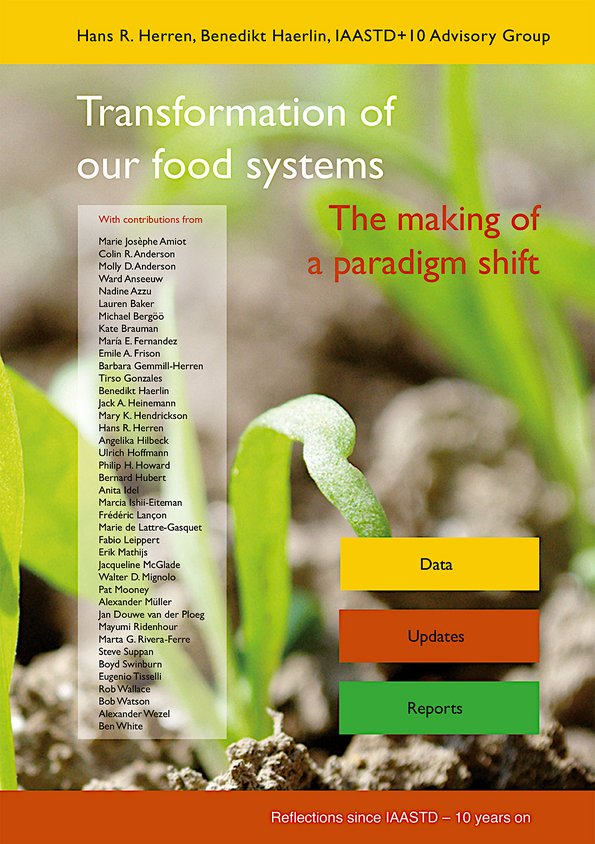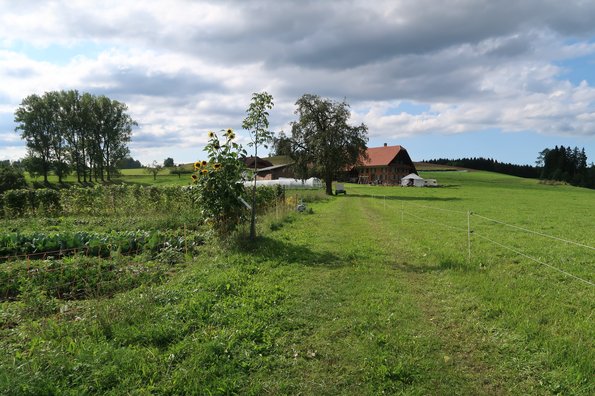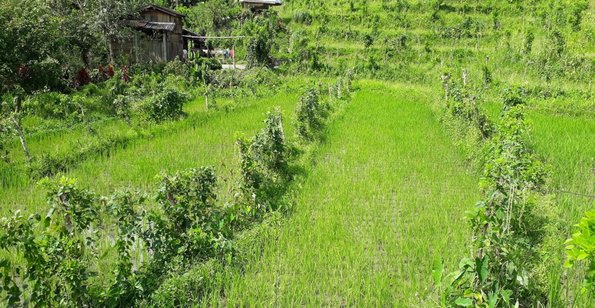“Agriculture at a crossroads” was the conclusion in 2009 – and today?
Notes on the IAASTD and the ten years since
by Beat Kissling and Petra Hagen Hodgson*
“The causes of the COVID-19 pandemic, or any other modern pandemic, are not a great mystery”, noted Peter Daszak during a workshop by IPBES1 in July 2020. “The same human activities that are pushing forward climate change and biodiversity losses are also increasing the risk of pandemics through their impact on our environment. Changes in the way we use land, the expansion and intensification of agriculture as well as unsustainable trade, production and consumption affect nature and lead to more contact between wildlife, livestock, pathogens and humans. This is how pandemics arise.2 These causal relationships are little known by the general public.3 Yet, the current experiences with COVID-19 may perhaps contribute to people’s awareness of the problematic role of prevailing industrialised agriculture for the well-being of humans and nature.
In fact, the relationship between pandemics and industrialised agricultural, trade and distribution systems have been well known at least since the 2009 International Assessment of Agricultural Knowledge, Science and Technology for Development (IAASTD) report. The IAASTD explained the occurrence and geographical spread of infectious diseases as a result of “intensification of crop production and animal husbandry”, “economic factors such as expansion of international trade as well as low producer prices”, of “mutations and evolution of pathogens” and the “speed with which people travel around the world.”4 The report also outlined counteractive measures. It stated: “Integration and co-ordination of political and agricultural measures and programmes along the entire food chain can counteract the spread of infectious diseases. Examples of these are extended crop rotations, greater crop diversity and lower herd densities, less transport and exchange of livestock across large geographical distances.”5 As can be seen from the explanations, the risk of pandemics increases in particular with a dwindling biodiversity. In 2010, scientists6 were able to show that among the general extinction of species, so-called 'buffer species', which make the spread of viruses more difficult or hinder it altogether, die out faster than other species such as the classic intermediate hosts of the pathogens, that spread them.7
The “Green Revolution” and its consequences
The current rapid extinction of species is a recent phenomenon in human history. The so-called “Green Revolution” of the 1960s,8 with which the World Bank intended to combat the hunger problem in the poor countries of the South, plays an important role. A whole bundle of agricultural innovations were made to permanently combat hunger. It became possible to breed high-yielding cereal varieties which had a greater number of calories. However, these varieties required the cultivation of pure monocultures and the use of synthetic fertilisers and pesticides.
At the same time, this method of cultivation forced small farmers, most of whom were economically disadvantaged, into buying hybrid seeds for higher yields and to take out loans to be able to finance them. Subsequently they became dependent on the agro-corporate suppliers. The age of industrialised or chemical agriculture based on high technology had begun. The “Green Revolution” was celebrated and adapted almost worldwide. Only gradually the serious damages and consequential costs for nature and people associated with it became apparent to the greater public. The global damage to the environment and thus also to the poorer rural population in the developing countries was a topic of discussion at the UN conference in Rio de Janeiro in 1992.
At the turn of the millennium the UN set a sign as the situation for several hundred million undernourished and poor people had not improved despite the celebrated “Green Revolution”. With the adoption of the millennium development goals it put the “fight against extreme poverty and hunger” at the top its agenda. The aim was to reduce the amount of people who have less than one US dollar a day to live on and the amount of people who suffer from hunger by half by 2015. A good two years later, several UN agencies initiated the preparation of a comprehensive report on the state of the world’s food systems, the IAASTD.
Meaning and content of the IAASTD
Over the course of four years, more than 400 scientists analysed the world’s food systems on all continents. They looked back 50 years to establish the necessary changes for the coming 50 years in order to overcome hunger and poverty while, at the same time, protect nature in a sustainable way. The retrospective analysis was not very edifying. Alongside millions of hungry people, the report showed the even larger amount of people suffering from obesity and malnutrition. It revealed that although billions of tons of grain are produced, half of it is not processed as food, but used as animal feed for meat consumption, for the production of fuel or as industrial raw material. In addition, it identified the current global food system as one of the most significant causes of climate change, species extinction, environmental pollution, water scarcity, preventable diseases, child labour, poverty and injustice.
In 2009, this balance sheet gave rise to the motto: “Business as usual is not an option”. The goals of the “Green Revolution” had fundamentally failed despite an increase in production. At the same time, this type of food system proved to be a serious burden on nature. The IAASTD called for a necessary paradigm shift: instead of focusing solely on an increase of production, driven by a purely technological and economical perspective, a multifunctional agriculture should be strived for, an agriculture, that includes ecological as well as social aspects. The support and encouragement of small farmers was seen as the key solution to the manifold problems. Small farmers should be able to develop their indigenous knowledge in cooperation with science; they should be given access to the necessary means (financial resources, land, networking and cooperation opportunities, infrastructure resources and access to human rights, especially for women) in order to be empowered to develop sustainable, innovative solutions in food production – as a basis for the necessary, fundamental change. Small farmers, who are already responsible for 70 % of food production worldwide, should at last be recognised and given a voice. In order to describe this notion of agriculture based on diversity and being in harmony with nature the term of agroecology was used in the report.
At the time of the publication of the IAASTD report back in 2009, it was hardly noticed. The world’s attention and thus the attention of politicians rested on the financial crisis. At least, the crisis and its repercussions led to a more critical thinking about the globalised economy. It was no coincidence that the political scientist and economist Elinor Ostrom was the first woman to receive the Nobel Prize for Economics at that time. In many years of worldwide research, she had been able to prove that people are very well able to manage common good without being profit-oriented. Her findings refuted the reductionist view, popular in economics at the time, that all people should be understood as homo economicus; this unfounded view provides a convenient justification for all forms of social inequality and misery, as if poverty and hunger were consequences of a natural or fated selection process. Following Ostrom’s socio-ethical approach to economics, the UN declared 2012 as the International Year of Cooperatives.
High time for the long overdue paradigm shift
Since then, the commitment to a different form of economic activity which respects human rights influenced discussions about the failures of industrialised agriculture and nutrition. In 2011, Benedikt Haerlin, who was a member of the supervisory board of the IAASTD from 2002 to 2008, acting as a representative of North American and European non-governmental organisations (NGOs), noted that a change in thinking had indeed taken place in wide circles of agricultural science and agricultural policy. More so, he stated that “the message of the IAASTD is part of the standard of scientific and political analysis”9. However, as Hans Herren, co-author and co-chair of the IAASTD, noted ten years later,10 NGOs were the sole contributor to a relevant dissemination of the IAASTD instead of state institutions or political representatives. In 2020, Herren and Haerlin took stock together with other authors and editors of the IAASTD with the publication of the book “Transformation of our food systems. The making of a paradigm shift”11. Thirty articles contained in the publication examine the extent to which the findings of the IAASTD have been put into practice over the past eleven years. Recent reports and statements by important agricultural policy organisations such as FAO, UNCTAD, CFS or HLPE12 are discussed in the book. Furthermore, numerous local and regional initiatives around the world are presented. Some articles deal with the transformation of food systems towards agricultural biodiversity and show different agroecological approaches worldwide. Others discuss the 2018 UN-proclaimed rights of smallholders and other people working in rural regions and their possibilities to make their voices heard. Others again focus on the relationship between food systems and health (of people and nature). All these articles confirm Haerlin’s impression of a civil society awakening, first expressed in 2011. Lastly, few articles focus on the resistance to the long overdue change and the failure of politics to initiate the paradigm shift on a broad societal level.
Agroecology, an agriculture of values: social, ecological, economic and democratic
While in economics and politics the solution to the problems at all levels of society (also globally) is essentially seen in technological progress (above all by means of digitalisation and artificial intelligence), Haerlin speaks in his introduction of a “de-humanisation” of agriculture. He demonstrates that instead of relying on values, one relies entirely on technological instruments. In contradiction to this still prevailing view, Haerlin argues for “[r]ehumanising, reconnecting, rebuilding and restoring the resilience of our food systems”13 as an answer to the undeniable challenges. Regarding agroecology, he points out that in the past, it was seen as a single concept. Today, this notion is understood as thousands of locally different forms of implementation – traditional as well as new forms. Agroecology is “both as a social and cultural concept and as a set of agricultural and food system practices […] one of the most holistic and convincing approaches to the challenges of the new paradigm”.14 As already described in the IAASTD report, smallholder farmers15 are still today regarded as the most important actors in the agro-ecological transformation process. Various authors emphasise the mostly respectful attitude of indigenous farmers towards nature. This is viewed as a clear contrast to the approach of affluent industrialised countries to nature, fostering high-tech mass production based on the idea of dominating, instrumentalising and exploiting it.
The underestimated importance of consumers in industrialised countries
The utilitarian approach to nature has led, among other things, to a situation in which industrialised countries produce cheap food in abundance (with enormous amounts of food waste) and have a population suffering from serious health issues as a result of malnutrition and overeating. The cheaply produced food ultimately claims its price through its consequential costs: initially, for the regeneration of the severely impaired natural environment and, in the longer term, for the damage to people’s health.
Many consumers do not realise until now that they themselves contribute to the industrialised food systems with their preference for cheap products. Many do not realise, that they even encourage politicians not to invest public money in the support of agroecological systems and thus deepen the status quo. According to various voices in the publication “Transformation of our food systems”, far too little is being done to encourage public awareness for healthy food. Few know, for instance, that organic food would actually, if the real (also external) costs of industrialised food were included in the price, be much cheaper. Also, not many are aware that industrialised agriculture is responsible for a large proportion of greenhouse gases (including humus depletion, artificial fertiliser production, methane and nitrous oxide). One must ask oneself, why citizens are not given a real understanding of the significant preventive work of a farmer who produces healthy food (without pesticides or antibiotic residues).
The influence of the “new multilateralism”
But what are the main obstacles to the long overdue change in agriculture? According to several articles of “Transformation of our food systems” it is a case of a few very influential, enormously profiting interest groups who, despite the IAASTD findings that have been available for eleven years, still have no qualms about continuing to push forward the compaction and poisoning of arable soil, accepting chemical and drug contamination of groundwater, clearing primeval forests and overexploiting resources in order to increase meat production, allowing undignified animal factories and animal transports over long distances, highly energy-intensive food transports around the world and the like – all of that for the sake of profit alone. The authors particularly blame a lack of will and courage of politicians for maintaining a food system with so many victims and few winners and for spending billions of taxpayers’ money on subsidising it (conventional industrialised agriculture).
It is, in particular, the Canadian winner of the Alternative Nobel Prize (1985), Pat Mooney, who shows that the politics of western industrial countries have not imposed any regulation on the excessive business practices of globally active agribusinesses in recent decades. As a result, an oligopoly of four gigantic, globally operating corporations has established itself: these are Bayer/Monsanto, ChemChina/Syngenta, BASF and Corteva, which control up to two-thirds of the global market for genetically modified seeds, synthetic fertilisers, pesticides, etc. In addition, according to Mooney, the well-known digital corporations as well as the world’s most influential asset management groups such as BlackRock, Vanguard and State Street are highly interested in investing in the food business.16
Mooney’s analysis on international agricultural policy was confirmed by the UN World Food Summit (WFS) held in September 2021, which was organised in close cooperation with the World Economic Forum (WEF). In the run-up to the food summit, there were talks of a “new multilateralism” as, for the first time, the WEF, as the representation of the world's most influential private business and financial companies, negotiated the future of global food systems as an equal partner, so to speak, with the participating countries. Mooney thus describes the problems of this summit in clear terms: “For the first time in UN history a Summit has been managed and structured by the agrifood industry”.17
It is also thought-provoking that the former Rwandan Minister of Agriculture, Agnes Kalibata, President of the Alliance for a Green Revolution in Africa (AGRA) since 2014, was appointed by UN Secretary-General Antonio Guterres as Special Ambassador of the World Food Summit. AGRA, whose stated goal is to bring the ‘Green Revolution’(i.e. increasing food production on a chemical basis) to Africa's smallholder farmers, was founded and subsequently funded by the Rockefeller Foundation as well as the Bill and Melinda Gates Foundation in 2006. AGRA promised to cut hunger and poverty by half by 2020. This, however, never became true, on the contrary, it became a real disaster.18
Acknowledgment of the Federal Council in the support of agroecology
At the World Food Summit, Switzerland was among “the first signatories of a newly formed coalition of governments and organisations that aims to strengthen agroecological approaches in research, policy and investment in the coming years,”19 writes Frank Eyhorn, executive director of Biovision, in a press release published immediately after the UN. He further states that President Guy Parmelin “explicitly acknowledged the support of agroecology in Switzerland's international cooperation” in his address and described “it as the basis for continuing the dialogue in Switzerland for the transformation of our food system “20. This statement may seem surprising in light of the two failed agricultural initiatives in June 2021 and the rather hesitant development of agricultural policy in Switzerland. But it reflects that the scepticism in the Swiss population towards the use of pesticides in agriculture has consistently grown nevertheless. This attitude is also expressed in the parliamentary initiative “The risk in the use of pesticides”, which received broad public support in the consultation process.
The reasons for the rejection of the referendums known as the “pesticide initiatives” probably go back to the fierce opposition by the bulk of the farming community. The majority of farmers feared that they would no longer be able to secure their livelihood if the initiatives were adopted – understandably so, especially since they could not count on the support of the majority of the Swiss citizens. The grave importance of the farming community in guaranteeing a healthy diet was, and unfortunately still is today, too little understood by many. The demand for cheap food (i.e., produced with chemical aids) is still much greater than for organically produced food. At the same time, parliament and the executive branch continue to establish many incentives to maintain an industrial approach to agriculture with their subsidy policy. Christian Hofer, Director of the Federal Office for Agriculture, instead emphasises the need to adopt a holistic approach to agriculture. He calls for “everyone from the farmer to the consumer to take joint responsibility for a sustainable food policy”.21 Hofer explains the holistic approach with the following words: “The challenges facing the food system, such as limited resources, overuse of ecosystems, food waste, health costs resulting from malnutrition, etc., are complex and interwoven. They can only be solved if the individual sectoral policies of agriculture, environment, spatial planning, health, economy, etc. work together and are coherently coordinated.”22
Furthermore, he underlines the importance of the role of the consumers, whose purchasing behaviour essentially determines what is produced and how. After the extremely emotional voting campaign around the agricultural initiatives, Biovision and other committed institutions, which are at the forefront of trying to pass on an understanding of the principles of agroecology to the general public, see particular importance in the re-establishment of a dialogue between all those involved and, in particular, the education of young people. Such a dialogue is important and promising. After all, who should be opposed to finally defeating hunger in the world, ensuring a secure future for coming generations, and truly caring for nature?
As the authors of “Transformation of our food systems” clearly express, the transformation or the paradigm shift to a nature- and people-friendly/oriented nutrition can only be achieved, if the people decide with conviction to go along this path. As soon as people understand that agroecology is a deeply ethical concept of agriculture, it will not take much persuasion to jointly take the necessary steps to achieve it. After all, the spirit of agroecology, based on equal cooperation between traditional indigenous knowledge and science as well as on the cultivation of democratic relationships, and being designed to foster a resilience-supporting relationship between people and nature, is strongly reminiscent of Albert Schweitzer’s timeless ethic of “reverence for life.” •
1 Intergovernmental Platform on Biodiversity and Ecosystem Services
2 Zukunftsstiftung Landwirtschaft (11 November 2020): IPBES-Bericht: Natur- und Artenschutz beugt Pandemie vor. (Future Foundation for Agriculture (11 November 2020): IPBES report: Nature and species conservation prevents pandemic.) Berlin, link: https://www.weltagrarbericht.de/aktuelles/nachrichten/news/de/34156.html
3 But see “Vom Nutzen der Viren und Schaden der Zoonosen” (“On the benefits of viruses and the harm of zoonoses”); in: Kultur und Politik 3/2020
4 Deutsche Gesellschaft für Technische Zusammenarbeit (GTZ)/Vereinigung Deutscher Wissenschaftler (2009): Synthesebericht – Weltagrarbericht. International Assessment of Agricultural Knowledge, Science and Technology for Development (IAASTD)
5 ibd., p. 171; https://www.weltagrarbericht.de/fileadmin/files/weltagrarbericht/IAASTDBerichte/IAASTDSyntheseDeutsch.pdf
6 In this article, the generic masculine is understood to be gender-neutral and thus applies to all people.
7 Brunner, J. (2 December 2010). “Artenschwund gefährdet menschliche Gesundheit. Veränderung natürlicher Ökosysteme begünstigt Überleben von Krankheitsüberträgern.” (Species loss endangers human health. Changes in natural ecosystems favour the survival of disease vectors.) In: scinexx – das wissensmagazin. Link: https://www.scinexx.de/news/geowissen/artenschwund-gefaehrdet-menschliche-gesundheit/
8 “Weitere Gründe sind in der Entwaldung und anderen Nutzungsänderungen zu suchen.” (Other reasons are to be found in deforestation and other changes of use.)
9 Haerlin, B. (9 December 2011). Genug statt mehr. Le Monde diplomatique
10 Herren, H. R. (8 January 2021). Transformation of Our Food Systems: The Need for a Paradigm Shift. Panel Discussion, Oxford Real Farming Conference.
11 Herren, H. R. & Haerlin, B. & IAASTD+10 Advisory Group (2020). Transformation of our food systems. The making of a paradigm shift. Zukunftsstiftung Landwirtschaft & Biovision, Berlin/Zürich
12 FAO = Food and Agricultural Organization, UNCTAD = United Nations Conference on Trade and Development, CFS = Committee on World Food Security, HLPE = High Level Panel of Experts on Food Security and Nutrition
13 Herren, H. R. & Haerlin, B. & IAASTD+10 Advisory Group (2020), p. 18f.
14 ibid., p. 19
15 They are often the real driving force in smallholder agriculture. Their social and cultural equality was already one of the declared goals of the IAASTD Report.
16 Mooney, Pat. in: Herren & Haerlin, 2020, cf. p. 37ff.
17 ibid., p. 39
18 Wise, Timothey A. (July 2020). Failing Africa’s Farmers: An Impact Assessment of the Alliance for a Green Revolution in Africa. Study report, Tufts University, Global Development and Environmental Institute, Working Paper No. 20-01
19 Eyhorn, Frank. Press release on 24 September 2021, Media Releases Switzerland, National Press Portal, 29 October 2021, Link: https://www.presseportal-schweiz.ch/pressemeldungen/un-ernaehrungssystemgipfel-den-worten-der-schweiz-muessen-jetzt-taten-folgen
20 ibid.
21 Statement at the “Forum Kurswechsel”, organised by BIOVISION on 2 December 2020, https://www.biovision.ch/berichtforumkurswechsel/
22 ibid.
* Beat Kissling, Dr phil., educationalist, psychotherapist (FSP), lecturer in environmental ethics ZHAW, advisory board of Bioforum Switzerland.
Petra Hodgson, art historian, lecturer at the IENR (Institute for Environment and Natural Resources), ZHAW, head of the Green and Health Research Group.
The article appeared in its first version in the journal Kultur und Politik 2/2021. Both authors have updated the text for Current Concerns.
Culture and Politics is the journal of the Bioforum Switzerland. It is a forum for sustainable organic agriculture.
Bioforum Switzerland grew out of the Möschberg tradition, the birthplace of organic agriculture in Switzerland, Germany and Austria. It is an association made up of farmers and many others interested in organic farming from all parts of the country. The editors of Culture and Politics strive to reflect the legacy of the organic pioneers, to develop it further and to make it useful for the present and the future.



